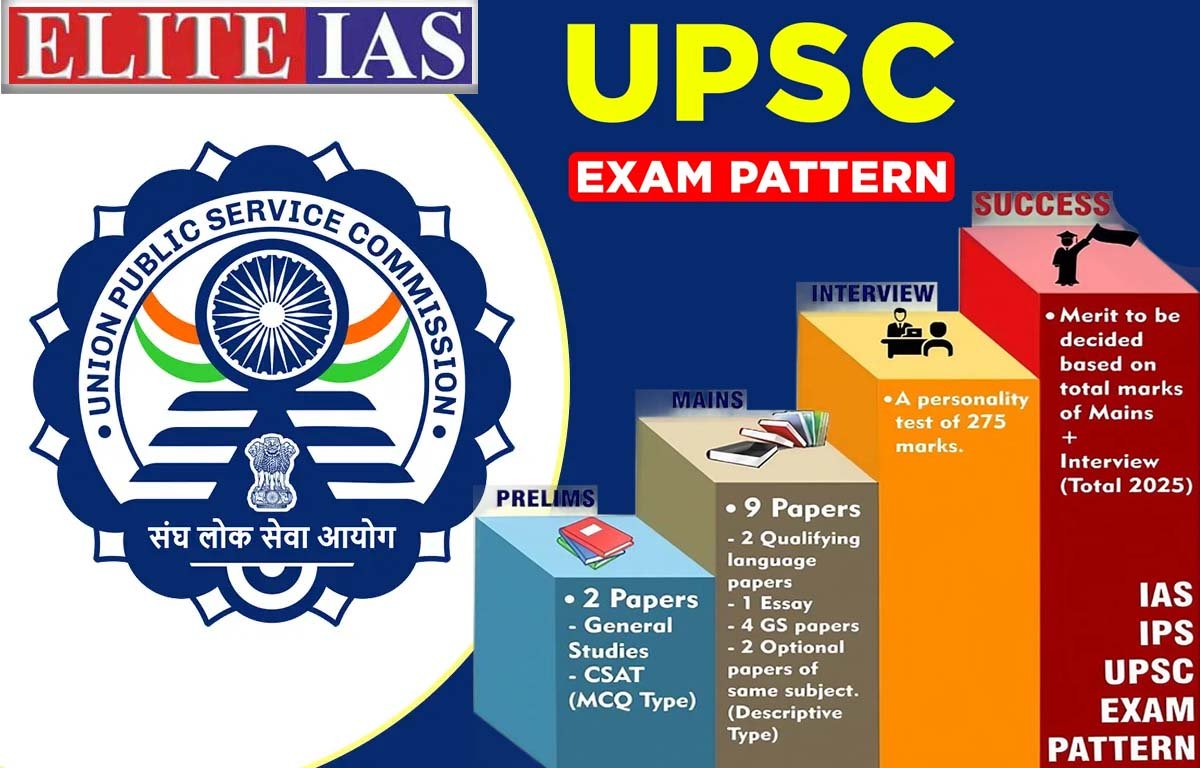
Exam Pattern of UPSC IAS Civil Services Examination
The UPSC Exam pattern is set by its organizing authority i.e., the Union Public Service Commission. . The IAS Exam is conducted yearly. UPSC has maintained the same paper pattern since the year 2013. The objective here is to give audience a detailed understanding of the UPSC exam pattern. As well as the UPSC syllabus for the upcoming Civil Services Examination in 2024.
The UPSC Civil Services Examination is known as one of India’s most challenging exams. Its reputation stems from the intense competition it attracts. Additionally, the syllabus covers an extensive range of topics. The complexity of the UPSC CSE exam pattern contributes significantly to its difficulty. The complete examination process begins with the preliminary stage. It takes nearly a year to complete, culminating in the announcement of final results.
What is UPSC Exam Pattern?
The UPSC exam pattern comprises multiple stages. This structure is designed to select skilled candidates for a range of civil service roles. It encompasses a Preliminary exam, a Mains exam, and a concluding Interview stage. Each phase of the UPSC exam is carefully crafted. It evaluates a range of skills, knowledge, and competencies. This approach ensures well-prepared candidates for roles in public service.
- Stage I –Civil Services (Preliminary) Examination
- Stage II –Civil Services (Mains) Examination
- Stage III – Personality Test or Interview
- IPS Indian Police Service
- IRS Indian Revenue Service
- IFS Indian Foreign Service
The three stages of the UPSC CSE Exam Pattern are as below:
UPSC Exam Pattern 2024
The UPSC civil services exam officially is divided into two stages i.e. Preliminary and Main Examinations. In practice, it also includes a third important stage, the Personality Test/Interview.
The IAS exam structure is well-defined. Candidates who pass the Preliminary Examination become eligible for the next phase. This phase is the Main Examination. Success in the Main Examination leads to a further opportunity. That opportunity is the Personality Test or Interview. This multi-stage process is comprehensive. It thoroughly evaluates a candidate’s abilities. Ultimately, it assesses their readiness for a civil services career.
Stage 1: UPSC CSE Prelims Exam Pattern
The Prelims Exam date is 26th May 2024.
The Preliminary stage of the UPSC exam pattern consists of two papers. Both of these papers are conducted on the same day. Each of these papers contains objective-type questions, offering multiple choices for each query. The Prelims serve a key role in the UPSC exam. They function as a screening stage. This stage filters candidates for the Mains Exam.Marks from the Prelims are important for qualifying to the Mains. However, they don’t add to the final merit list. Candidates should prepare diligently for Prelims, as cut-off marks are quite unpredictable. It vary based on the yearly average scores. The details of UPSC prelims pattern is given below:
| Civil Services Exam Pattern – Prelims | |||||
| Paper | Type | No. of questions | UPSC Total Marks | Duration | Negative marks |
| General Studies I | Objective | 100 | 200 | 2 hours | Yes |
| General Studies II (CSAT) | Objective | 80 | 200 | 2 hours | Yes |
| Total UPSC marks for Prelims | 400 (where GS Paper II is qualifying in nature with minimum qualifying marks fixed at 33%) | ||||
Stage 2: UPSC CSE Mains Exam Pattern
The UPSC exam pattern for the Mains stage consists of 9 papers. This is comprehensive in nature and these 9 papers are spread across 5 to 7 days. To qualify to the Mains stage, several criteria must be met during the Prelims. Candidates need to secure the declared cut-off marks in General Studies Paper I. They also have to score at least 33% in General Studies Paper II (CSAT). These requirements are essential for advancing beyond the Preliminary phase. This is a mandatory criterion to be eligible for appearing in the Mains Examination.
Regarding the UPSC Mains exam pattern, it comprises exclusively descriptive answer type questions. The Mains stage of the UPSC exam is exhaustive and critical. It significantly influences the candidates’ overall performance. The scores achieved here have a major impact on the final tally. Thus, the marks obtained in the Mains are important for the final merit list. Further, the details of UPSC syllabus with marks are given below:
| UPSC CSE Exam Pattern – Mains | |||
| Paper | Subject | Duration | IAS Total marks |
| Paper A | Compulsory Indian language | 3 hours | 300 |
| Paper B | English | 3 hours | 300 |
| Paper I | Essay | 3 hours | 250 |
| Paper II | General Studies I | 3 hours | 250 |
| Paper III | General Studies II | 3 hours | 250 |
| Paper IV | General Studies III | 3 hours | 250 |
| Paper V | General Studies IV | 3 hours | 250 |
| Paper VI | Optional I | 3 hours | 250 |
| Paper VII | Optional II | 3 hours | 250 |
In the UPSC Mains exam, all papers contribute to the overall merit ranking. The only exceptions are the language papers, i.e. Paper A and B. Papers A and B are of a qualifying nature. Candidates are required to score a minimum of 25% in each. Achieving the qualifying marks is a prerequisite in the UPSC Mains exam. Only then are the scores from Papers I to VII considered for the ranking process.
Paper A, a language test, is not a mandatory requirement for all candidates. Specifically, candidates from North-Eastern states such as Arunachal Pradesh, Manipur, Meghalaya, Mizoram, Nagaland, and Sikkim are exempted. This exemption also extends to candidates with hearing impairment. However, they need to provide valid proof of exemption from second or third language courses. This proof must be issued by their respective educational board or university. The language options for Paper A are diverse, allowing candidates to choose from any language listed in the 8th Schedule of the Indian Constitution. This provides a wide range of language choices to the candidates.
The General Studies Papers in the Mains Examination cover the following subjects:
| General Studies I | General Studies II | General Studies III | General Studies IV |
| Indian Heritage and Culture | Governance | Technology | Ethics |
| History and Geography of the World | Constitution | Economic Development | Integrity |
| Society | Polity | Bio-diversity | Aptitude |
| Social Justice | Environment | ||
| International relations | Security and Disaster Management |
For Papers VI and VII in the mains examination, candidates must select one subject from a specified list of optional subjects:
| Agriculture | Animal Husbandry and Veterinary Science | Anthropology | Botany | Chemistry |
| Civil Engineering | Commerce and Accountancy | Economics | Electrical Engineering | Geography |
| Geology | History | Law | Management | Mathematics |
| Mechanical Engineering | Medical Science | Philosophy | Physics | Political Science and International Relations |
| Psychology | Public Administration | Sociology | Statistics | Zoology |
| The literature of any one of the following languages: Assamese, Bengali, Bodo, Dogri, Gujarati, Hindi, Kannada, Kashmiri, Konkani, Maithili, Malayalam, Manipuri, Marathi, Nepali, Odia, Punjabi, Sanskrit, Santhali, Sindhi, Tamil, Telugu, Urdu and English. | ||||
Except for the Language papers A and B, candidates may respond to all other papers in English or any language included in the 8th Schedule of the Indian Constitution. Furthermore, for optional papers, candidates have the flexibility to write in English, regardless of the language chosen for other papers.
Stage 3: UPSC CSE Pattern for Interview
This is the final stage of the IAS Exam before the final results are announced. Officially, it is considered as a segment of the Mains Examination. It plays a vital role in the merit ranking process. In terms of preparation, this phase is distinctly acknowledged as the third stage. The reason for this is the notable difference in preparation methods for written exams compared to interviews. In accordance with the IAS exam pattern, this stage involves an interview conducted by the UPSC board. The interview’s objective is to assess candidates’ aptitude and suitability for a civil services career. Additionally, it evaluates their capability to manage the responsibilities associated with the role.
The board consists of experienced and impartial members. These members are well-informed about the candidates’ career records. They evaluate various mental and social traits of the candidates. The process includes asking broad-interest questions. These questions test mental alertness and critical assimilation skills. They also assess clarity of expression and balanced judgement. Additionally, they evaluate in-depth interest, social cohesion ability, leadership skills, and moral and intellectual integrity. This thorough assessment aims to select candidates with both high intelligence and qualities vital for responsible civil service.
| UPSC Interview Total Marks | 275 |
In the UPSC interview stage, the total allocation of marks is set at 275. This figure, when combined with the marks of the UPSC Mains examination, culminates in a grand total of 2025 marks. This aggregate score forms the basis for the merit list consideration in the UPSC examination process.
The UPSC IAS exam structure is comprehensive and highly competitive. Aspirants are advised to start their preparation journey with thoroughness and depth, considering the exam cycle spans nearly a year. Not securing the expected results in one attempt means having to start from the beginning in the following year. This emphasizes the significance of adopting a strategic and thoroughly planned preparation method.Wishing you success in your UPSC journey!
Frequently Asked Questions (FAQs)
1. What is UPSC?
Answer: – Union Public Service Commission (UPSC) is body which every year conducts several exams to recruit personnel for Central Services.
2. What should I do to become an IAS/IFS/IPS officer?
Answer: – For selecting IAS/IFS/IPS officers, UPSC every year conducts Civil Service Examination. Any aspirant for IAS/IFS/IPS needs to pass this exam for getting selected.
3. What is the structure of UPSC Civil Services Exam?
Answer: – The UPSC civil services examination is conducted in three phases: – Prelims, Mains and interview.
4. Can anyone apply online for a particular examination?
Answer: – Yes, an applicant who fulfils the eligibility criteria prescribed in the notification (i.e. the detailed information available on website (https://upsconline.nic.in/ ) of that particular examination can apply.
5. Is there any age limit for appearing in UPSC Civil Services Examination?
Answer: – Any candidate from General category more than 21 and less than 32 years of age is eligible to appear for the above-mentioned exam. The upper age limit is relaxed up to a maximum of five years for candidates belonging to SCs or STs Categories and up to a maximum of three years for candidates of OBC category among others.
6. What are the subsets of IAS?
Answer: – IPS, IRS, IFS fall under the aegis of the IAS exam and the cutoff to get recruited in the services mentioned above is decided after the conduction of the exam. A good understanding of the target is what will streamline the preparation and to keep the focused better.
7. What is the Time required for entire UPSC exam preparation?
Answer: – Experts believe that aggressive preparation for 10 to 12 months is a must. Four out of every 10 Indians (21-32 years) aspire to become an IAS officer and competition is so intense that only 5 percent of that massive number gets through.
8. Can UPSC be cracked in 1 year?
Answer: – Yes, one year is sufficient to crack IAS exam with appropriate planning. The IAS exam which is also known as the civil services exam is a government exam conducted annually by the UPSC.
9. Is there any limit on number of attempts that I can take for UPSC exams?
Answer: – As per revised rules, a candidate belonging to General category can take upto 6 attempts; those belonging to OBC can take up to 9 attempts. There is no limit on number of attempts available for candidates belonging to SC and ST communities. For more details visit the UPSC website: http://www.upsc.gov.in/
10. Why IAS? /PI quotient
Answer: – Before stepping into the preparation of one of the most competitive exams in the nation, an aspirant must get his/her PI (personal interview) quotient scoped-out. During personality test, a candidate’s candidature would be measured against his/her performance. Once he/she gets the PI quotient evaluated, the candidate would have a clearer mindset throughout the preparation.
11. In which of the examinations conducted by the UPSC, candidates can write answers in any of the languages included in the Eighth Schedule to the Constitution
Answer: – Presently only in Civil Services (Mains) Examinations conducted by the UPSC, the candidates can write answers in any of the languages included in the Eighth Schedule to the Constitution.
12. Which is the highest post in UPSC?
Answer: – The highest post in UPSC is Cabinet Secretary. The Cabinet Secretary is the IAS top post and senior civil officer of the India’s government




